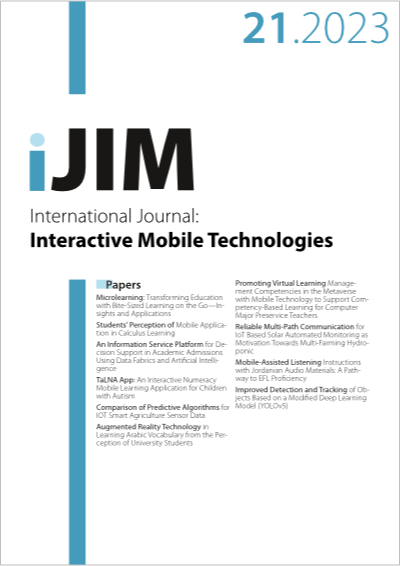Mobile-Assisted Listening Instructions with Jordanian Audio Materials: A Pathway to EFL Proficiency
DOI:
https://doi.org/10.3991/ijim.v17i21.42789Keywords:
Keywords: Listening better, English for Foreigners, Quantitative research, Comprehension Vocabulary Listening skillsAbstract
This research examined the impact of mobile devices and Jordanian audio resources on the listening abilities of English as a foreign language (EFL) learners. The research included 100 EFL students from Jadara University in Jordan, with 50 students in the experimental group and 50 students in the control group. Quantitative research and ANOVA testing were used to analyze the data. Both groups were pre- and post-tested on listening comprehension, vocabulary, and proficiency. ANOVA was used to compare the mean scores between the experimental and control groups. The ANOVA test determined the impact of mobile devices and Jordanian audio on participants’ listening abilities. The test compared the mean scores of the experimental and control groups to determine whether the intervention significantly improved listening skills. The ANOVA test showed that mobile devices and Jordanian audio resources improved the listening abilities of EFL learners. The experimental group had a superior understanding of vocabulary and listening skills compared to the control group. These studies show that mobile devices and realistic audio content improve EFL listening training. ANOVA showed that this training strategy improved listening skills. This research contributes to the literature on EFL pedagogy literature and assists EFL teachers and curriculum designers in enhancing their listening skills. Future studies may examine other factors that could impact the effectiveness of mobile devices and audio resources in EFL listening training, including intervention duration and learner proficiency. This research shows that these materials can enhance the listening experiences of EFL student.
Downloads
Published
How to Cite
Issue
Section
License
Copyright (c) 2023 luqman Rababah

This work is licensed under a Creative Commons Attribution 4.0 International License.


